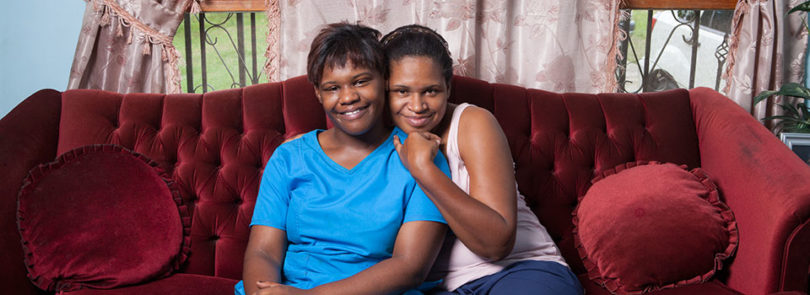Some 40 percent of this country’s poorest people, mostly African-Americans, live in the rural Deep South-in the small communities of the sandy Coastal Plain that stretches like a belt across the belly of the Southeast from North Carolina to Mississippi. Formerly farmland, Georgia’s Coastal Plain now supports little but pine trees, gas stations, and fast food restaurants frequented by travelers from metro Atlanta bound for sunny seaside vacations. Poverty and unemployment rates here are among the highest in the United States.
Few academics venture to this region. But in 1987, Gene Brody, founder and co-director of the University of Georgia’s Center for Family Research, visited in his capacity as associate vice president for research. He spoke to a group of African-American businesspeople about the role of research in economic development-and also about his own work on how families promote well-being, mental health, and resilience in children. “That’s nice, Dr. Brody,” said one man politely. “But what do you know about our families?”
Brody had established himself early in the field of human development by investigating issues such as parent-child relationships that avert difficulties at home and school-processes that do affect rural African-American families. And although it would take him a few years to design the studies, secure funding, and earn the trust of his future research subjects, Brody would, some 25 years later, know more about the struggles and triumphs of the people of the Coastal Plain than any other researcher in the world.
“Because isolation defines rural poverty,” says Brody, “these families and communities were invisible. There is no transportation system to carry people to and from jobs in cities, nor are there parks, recreational facilities, or medical services for the poor. And because there were no agencies to help us identify families, we had no support in trying to learn about their needs.”
His first grant proposal “was swiftly and soundly rejected,” Brody recalls. But he persisted. In 1989, through funding from a private foundation and several entities of the National Institutes of Health, Brody initiated the first large-scale longitudinal studies of rural African-American families living in the Southern Coastal Plain. He laid the groundwork by meeting with leaders in some of the poorest counties of South Georgia.
Working through schools, churches, extension offices and civic groups, he found families willing to participate in the studies. He set up focus groups, and established an African-American community liaison in every county. Soon, hundreds of families were allowing researchers into their homes, where the interviews were conducted by African-American researchers and graduate students from UGA.
Today, Brody and his team oversee not only multiple large research projects but also protective prevention programs that grew out of their long-term findings. For example, the Strong African American Families Program (SAAF), featuring a seven-week interactive course for parents and their pre-adolescent children, has, over time, enrolled more than 1,000 families across 20 rural Georgia counties, many of whom Brody still follows. The original program, and others that grew out of it, have been so successful in protecting young people against pitfalls such as drug and alcohol abuse that they have been adopted by numerous cities, including San Francisco, Houston, Denver, Detroit, Pittsburgh, Atlanta, and Washington, D.C.
Initially, Brody set out to address two important questions: “What creates success in the midst of such overwhelming challenges?” and “What are the psychological and biological consequences of poverty for children, parents, and indeed, whole communities?
“Despite the difficulties of their situations, most families were raising competent young people who weren’t having problems,” he says. Yet many others were struggling with depression, discrimination, alcohol and drug abuse, and HIV.
The successes, Brody found, often derived from “competence-promoting parents, who applied very high levels of control and set clear limits for their children,” Brody came to learn. “But they coupled that control with high levels of emotional support. Rural African-American parents called this approach ‘no-nonsense parenting.’ These same parents were also teaching their children strategies for dealing with racial discrimination. They particularly emphasized not letting racial slurs define who the young people were and not accepting discrimination. By contrast, we found that discrimination caused emotional and health problems for children who didn’t get this emotional support.”
Children’s resilience also derived from a unique cluster of family practices among rural African-Americans, including child care provided by extended family members, especially grandmothers, as well as the informal networks of neighbors who monitor each other’s children. And parents’ involvement in community organizations (including churches)-especially in working with the rural school systems’ teachers-benefited children as well, the researchers discovered.
To arrive at these and other findings, Brody approached his research like a bench scientist, developing and empirically testing theories about how specific social interactions-especially those within families and communities-promote or undermine family health and functioning, especially children’s emotional health.
“Gene Brody is a sophisticated methodologist,” says Steven Beach, a colleague and former director of the Owens Institute for Behavioral Research. “As a result, his work has been groundbreaking. It melds traditional developmental psychology with social psychology, clinical psychology, and stress biology to generate new directions for prevention science.”
In addition to the original prevention program for pre-adolescents, Brody’s team developed others, such as the Strong African American Families Teen Program and the Adults-in-the-Making Program for young adults.
More recently, Brody and his team studied the most resilient kids later in their lives, looking at how economic hardship and stress affect not only their psychological well-being as adults but also their biological health. The researchers asked these former participants for blood and urine samples in order to check their levels of stress hormones such as cortisol and adrenaline as well as to look for markers of inflammation such as cytokines and C-reactive protein. Most were glad to oblige.
Brody had speculated that if disadvantaged kids were succeeding academically and emotionally, they might also somehow be protected from chronic health problems common in low-income youth. But he found that there was actually a biological cost to overcoming the odds. Young adults who grew up in poverty yet nevertheless were excelling in school, attending college, and showing low levels of problems such as depression, drug abuse, and obesity also had elevated blood pressure, high levels of circulating chemicals that promote inflammation, and significant concentrations of stress hormones. They were at high risk for developing diabetes, heart disease, and stroke, among other health problems.
“Most people believe that chronic diseases start in middle age,” says Brody. “But for rural African-Americans living in poverty, these conditions may well begin in childhood and adolescence. Even those youths who are psychologically resilient-people who have seemingly beat the odds-look very different under the skin.”
In addition, “most participants in our study were the first in their families to attend college,” says Brody. “They felt tremendous internal pressure to succeed, and many felt socially isolated and disconnected from peers with different backgrounds. Some also encountered racism and discrimination.”
In July, a team of scientists in the Center for Family Research received two new grants from the National Institutes of Health that together provide more than $7 million for more research and prevention programs of the kind outlined above. One grant supports ongoing work in the Strong African American Families Healthy Adult Project, which has followed 493 African-Americans since they were 11 years old. The other provides renewed funding for the Center for Translational Prevention Science, where researchers will focus on how stress alters neuroendocrine and immune systems as well as the brain in ways that affect drug use and risk behavior. Both projects involve collaborations with researchers and participants across the nation.
“The success of these programs is a testament to the trusting relationships my colleagues at the Center for Family Research have formed with these families-and the families’ trust in what we do,” says Brody. By the time this [latter] project ends in 2019, the participants in these studies will be 30 years old. “So you could say we’ve grown up together.”








